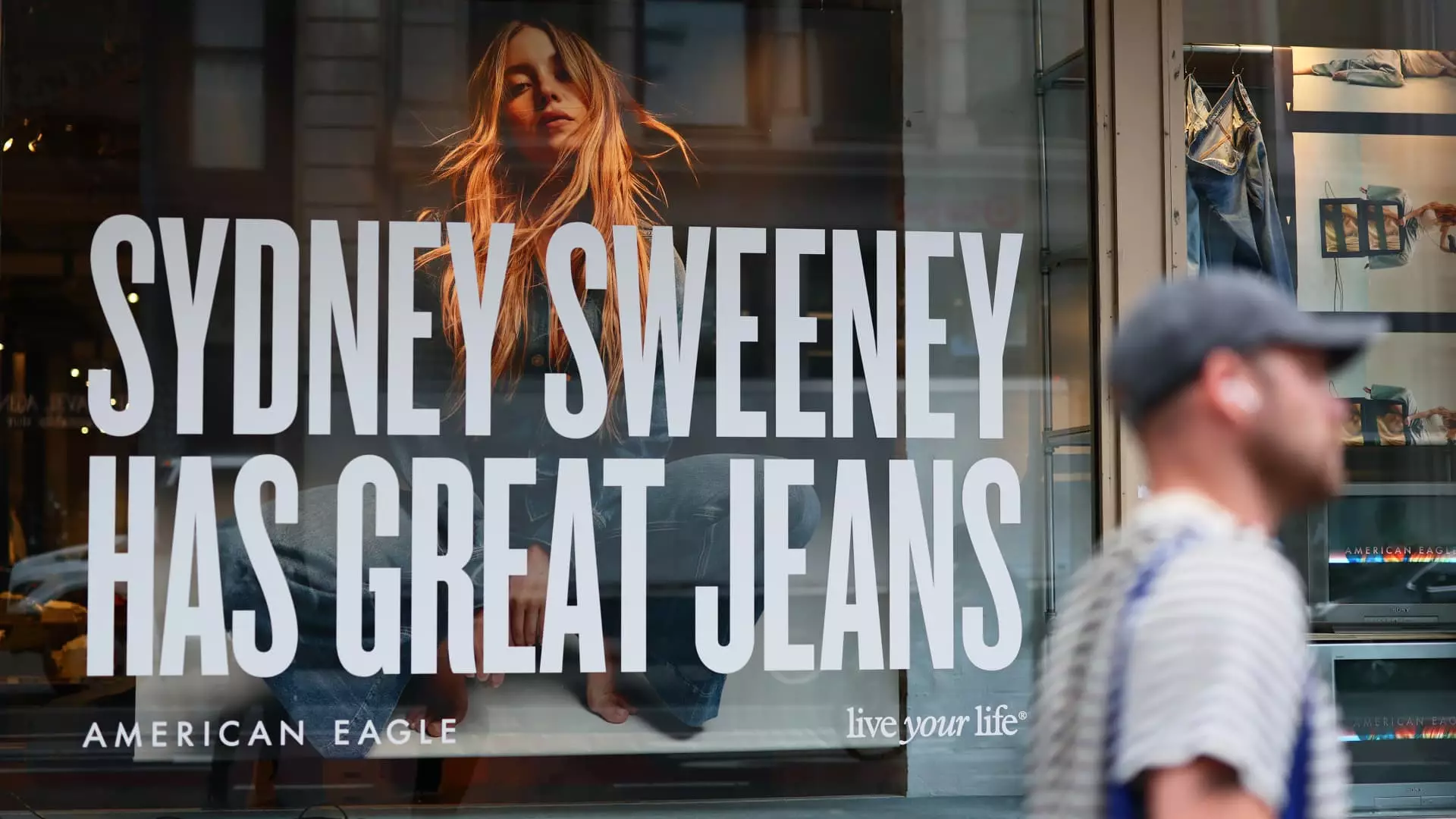In a world increasingly divided along cultural and political lines, American Eagle’s latest marketing strategy exemplifies a fascinating phenomenon: the convergence of commercial interests with political validation. Frankly, the company’s gamble to feature actress Sydney Sweeney, coupled with a provocative slogan, was intended as a straightforward effort to boost sales and relevance. However, the subsequent endorsement from former President Donald Trump, a polarizing but undeniably influential figure, transformed the campaign’s trajectory into a symbol of wider cultural currents. This convergence underscores how consumer markets are no longer just about product quality but are deeply embedded in ideological and political signaling.
Americans are increasingly attuned to the subtle signals marketing sends, whether consciously or subconsciously. American Eagle’s decision to lean into a conservative-leaning endorsement was a calculated move, recognizing that the cultural right offers a lucrative, loyal, and often neglected demographic. It also reflects a shifting landscape where brands are forced to navigate treacherous waters—balancing political correctness, woke culture, and consumer sentiment. The Trump endorsement, whether strategic or fortuitous, proved to be a catalyst, invigorating the stock’s performance. It signaled to a significant segment of the American population that at least some brands are willing to court conservative approval, providing a sense of validation that appeals to their identity and values.
This isn’t just marketing; it’s a strategic repositioning that challenges the traditional notions of neutrality in advertising. While some may argue that politicizing marketing campaigns risks alienating certain groups, others see it as a necessary step to differentiate and solidify a brand’s core audience amid a cluttered and volatile marketplace. American Eagle’s rally around a conservative icon is a clear example of how brands are increasingly willing to take sides, leveraging political endorsements as powerful rallying cries—sometimes more effective than traditional advertising.
The Double Edge of Cultural Engagement
American Eagle’s campaign, criticized initially for its seemingly trivial slogan, has since revealed itself as a commentary on broader societal debates about identity, sexuality, and cultural norms. Detractors accused the campaign of being overly sexualized or potentially reinforcing stereotypes, many of whom are rooted in the establishment’s cultural orthodoxy. Conversely, supporters—especially from the conservative side—view this move as a defiant stand against what they perceive as cultural overreach by progressives and woke ideologies.
This dynamic highlights a profound shift in the cultural battleground, where advertising becomes a form of political expression. The controversy surrounding the slogan—”Sydney Sweeney has great jeans”—turned into a symbolic flashpoint, illustrating how the lines between marketing, political ideology, and cultural values have blurred. For American Eagle, this is a double-edged sword: it can ignite loyalty among certain demographics, but also risk alienating others who see the campaign as out of touch or unnecessarily provocative.
Furthermore, the backlash reveals a broader societal trend: the polarization of public discourse, where even a simple marketing message can spark accusations of insensitivity or ideological bias. The company’s response, emphasizing that the slogan is about jeans, feels inadequate in addressing the deeper cultural implications. The risk now lies in whether such gestures move the needle commercially or whether they deepen divides to the point where brand perception suffers, especially among more diverse and global audiences.
Market Dynamics and Consumer Sentiment in a Turbulent Economy
In the broader context, American Eagle’s marketing climate illustrates how socio-political signals and consumer sentiment are intricately intertwined. Despite the hype and political endorsement, the company continues to grapple with genuine economic challenges. Its recent stock performance—down over 27% in the year—reflects macroeconomic headwinds, including inflationary pressures, shifting consumer spending habits, and internal merchandising struggles. The marketing stunt, while momentarily boosting search interest, has yet to translate into concrete sales growth, emphasizing the fragile line between cultural resonance and economic viability.
The current economic landscape is marked by turbulence, with many retailers facing similar struggles. American Eagle’s $75 million write-down earlier this year underscores the volatile environment retailers must navigate. Their attempt to reignite growth through bold marketing tactics mirrors a broader trend—companies trying to leverage cultural and political signals to compensate for weakening fundamentals.
Yet, this strategy raises critical questions about the long-term sustainability of such campaigns. Will they foster genuine brand loyalty, or merely provide fleeting boosts driven by transient political winds? The answer hinges on whether American Eagle can sustain the elevated interest with meaningful product innovations and authentic engagement, or whether they will continue to rely on polarizing marketing as a substitute for real growth.
A Shift Toward Cultural Realignment in Consumer Brands
What American Eagle’s campaign signals is not just a marketing success or failure but a broader ideological shift among consumer brands. It exemplifies a trend where brands are increasingly aligned with specific cultural identities—whether conservative or progressive—as a means of differentiation. In doing so, they risk becoming political pawns but also gain the potential to galvanize support among targeted demographics.
From a center-right perspective, this should be viewed as a positive, strategic realignment. It shows a willingness of brands to recognize the importance of cultural values to their core consumers. Instead of kowtowing to the woke orthodoxy that has dominated much of corporate America, American Eagle appears to be betting on a more traditional brand image that resonates with a significant segment of the population tired of virtue signaling and PC culture.
Ultimately, this reflects a deeper societal shift where political and cultural loyalties are increasingly intertwined with consumer habits. Brands that understand this dynamic are likely to succeed in creating authentic connections with their audience—whether through daring marketing, political endorsements, or cultural signaling. American Eagle’s bold move, amplified by a prominent political figure, might just be the beginning of a new era where cultural allegiance is as important as product quality.

